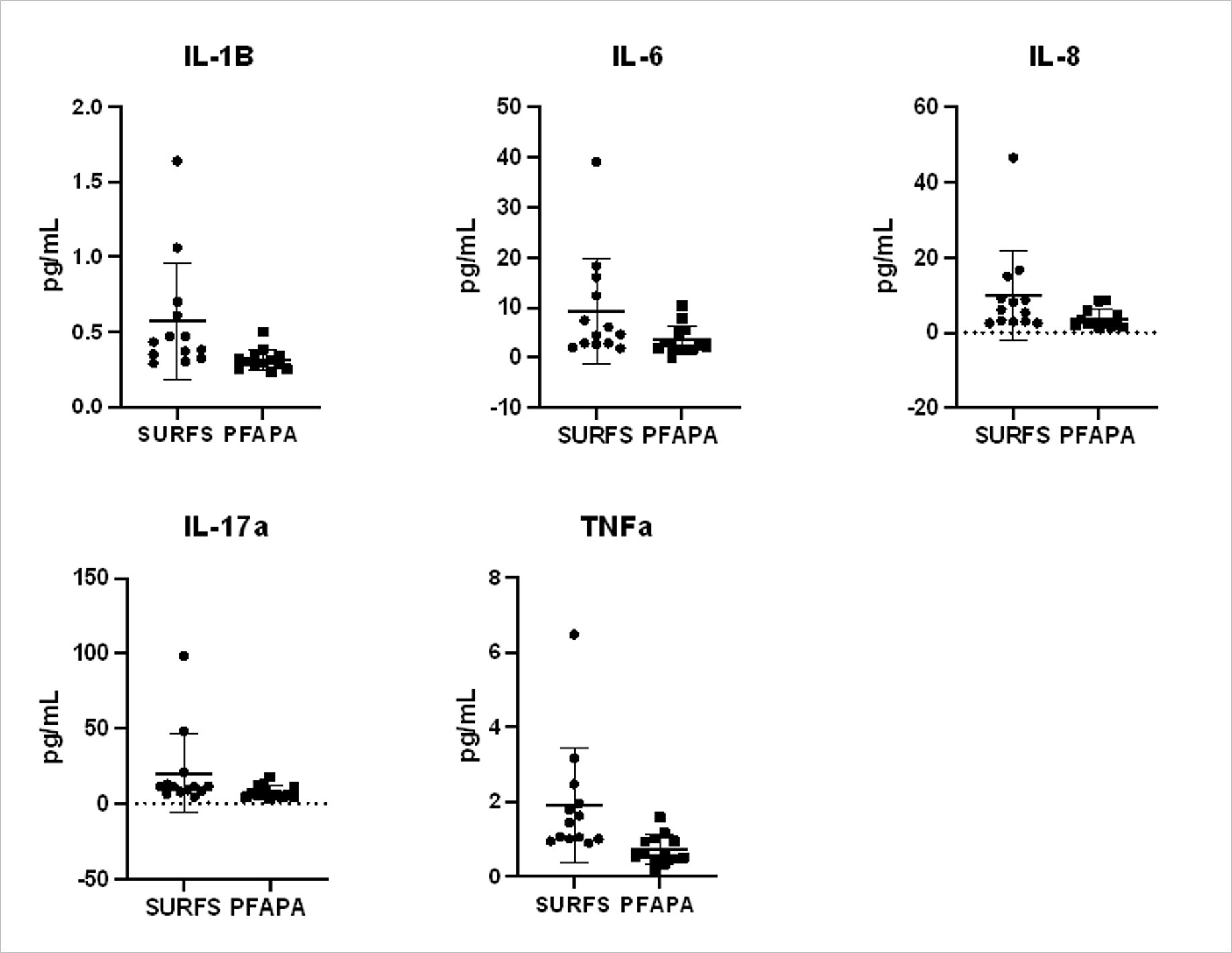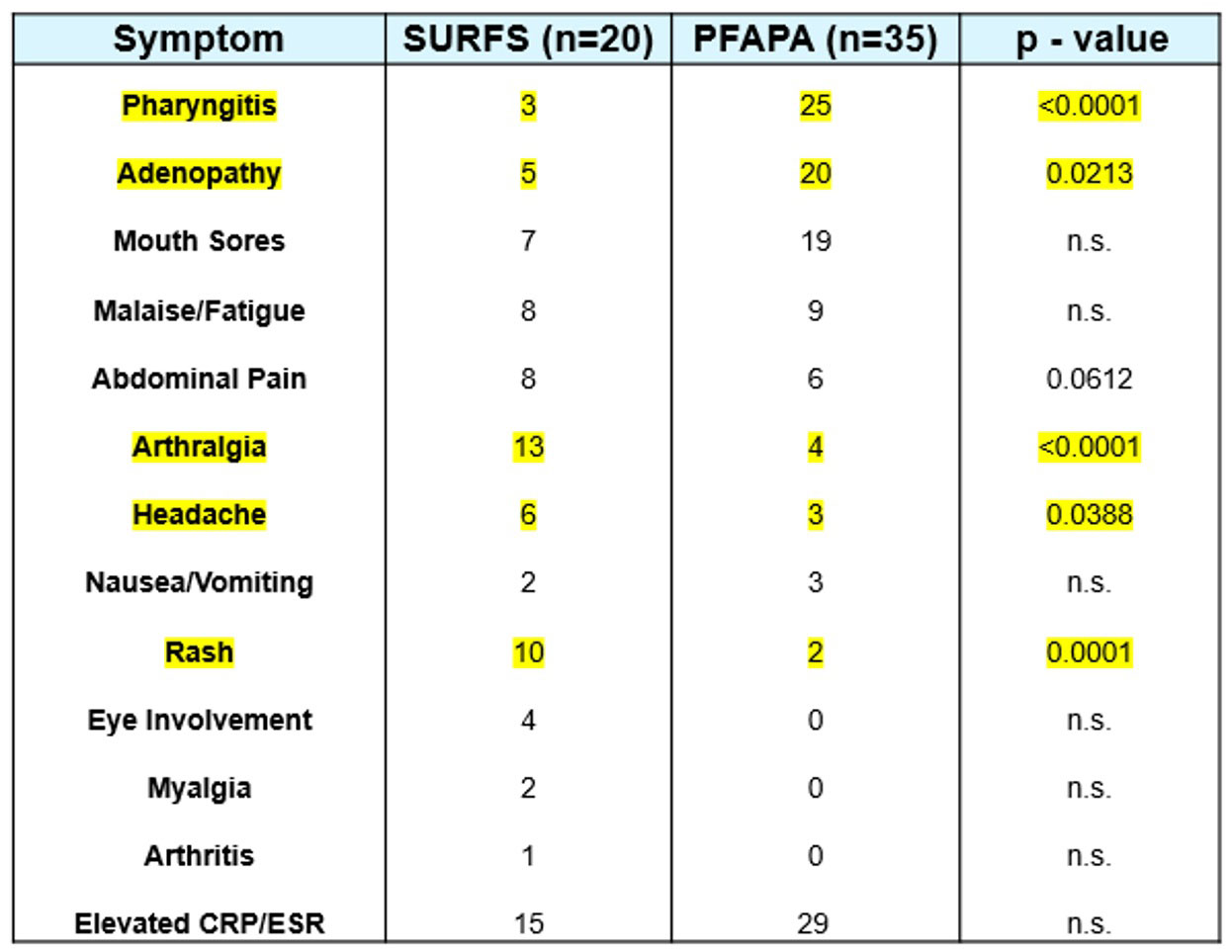Session Information
Session Type: Poster Session D
Session Time: 1:00PM-3:00PM
Background/Purpose: Unexplained, recurrent fevers are a common presentation to pediatric rheumatology and a cause of significant burden to affected families due to days of daycare or school missed for the child, and days of work missed for the parent. Syndrome of Undifferentiated Recurrent Fevers (SURFS) represents a heterogeneous group of disorders characterized by self-limited recurrent fevers and systemic autoinflammation without confirmed molecular diagnosis of a Hereditary Recurrent Fever syndrome, and not fulfilling criteria for Periodic Fever, Adenitis, Pharyngitis, Aphthous stomatitis syndrome (PFAPA). Very little is currently known about SURFS, and many different phenotypes are likely encompassed by this term. Our overall aim is to separate patients diagnosed with SURFS by endotype, and to analyze the cytokine signature, genetic mutations, and responses to treatment that are associated with each group.
Methods: We identified 20 patients from our autoinflammatory registry that met criteria for SURFS based on history of recurrent fevers, a negative Periodic Fever panel, and symptoms that did not fit PFAPA. Baseline data was collected at enrollment, including their symptoms during episodes, family history, genetic testing, and inflammatory markers/cytokines. In some patients, whole exome sequencing was done, with focused analysis of 394 genes implicated in known inflammatory disorders as well as primary immunodeficiency syndromes.
Results: We found pharyngitis and adenopathy were present in a minority of SURFS patients compared to PFAPA. In SURFS, pharyngitis was present in 3/20 patients compared to 25/35 PFAPA patients (p< 0.0001), and adenopathy was present in 5/20 SURFS patients compared to 20/35 PFAPA patients (p=0.02). Arthralgias, headaches, and rash were significantly higher in SURFS compared to PFAPA (p < 0.0001, 0.038, and 0.0001, respectively). Cytokines IL-1B, IL-6, IL-8, IL-17a, and TNFa of SURFS patients were also significantly higher than in PFAPA. Genetic variants of unknown clinical significance (VUCS) were frequently found in patients with SURFS. Several patients had mutations in genes that are implicated in B cell development, immunodeficiencies, granulocyte/monocyte development, and inflammatory bowel disease risk. 3 patients had DOCK2 mutations and 2 patients had CASP mutations; patients with these mutations had similar febrile episodes. 3 patients who had more severe fever episodes, defined as having 6 or more symptoms, had a mutation implicated in the NFkB pathway and eventually failed colchicine therapy and necessitated IL-1 blockade.
Conclusion: SURFS is a heterogeneous group of patients with recurrent fevers but without a known monogenic cause. Our preliminary findings suggest SURFS has distinct clinical and immunologic features from disorders like PFAPA. We also find frequent VUCS in pathways which may have relevance to disease pathogenesis, and possible associations to SURFS endotypes. Further research is necessary to understand these SURFS endotypes, what drives the disorder, and how physicians can better predict which treatment will be most successful for each patient.
To cite this abstract in AMA style:
Macaraeg M, Matt M, Schulert G, Baker E, Handorf E. Genetic Variants and Cytokine Signatures in Patients with Syndrome of Undifferentiated Recurrent Fevers [abstract]. Arthritis Rheumatol. 2022; 74 (suppl 9). https://acrabstracts.org/abstract/genetic-variants-and-cytokine-signatures-in-patients-with-syndrome-of-undifferentiated-recurrent-fevers/. Accessed .« Back to ACR Convergence 2022
ACR Meeting Abstracts - https://acrabstracts.org/abstract/genetic-variants-and-cytokine-signatures-in-patients-with-syndrome-of-undifferentiated-recurrent-fevers/


